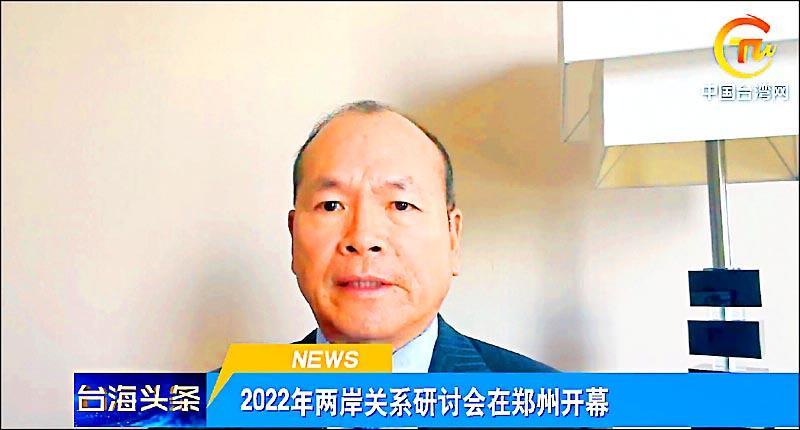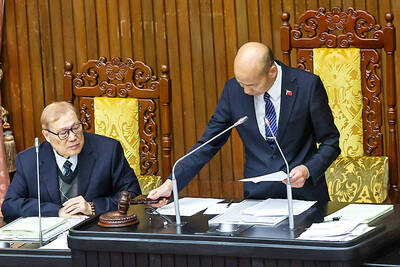Comments by a member of a Chinese Nationalist Party (KMT) delegation to China could cause a rift in society, Mainland Affairs Council (MAC) Deputy Minister Chiu Chui-cheng (邱垂正) said yesterday.
KMT Mainland Affairs Department head Lin Chu-chia (林祖嘉), who was part of a recent delegation to China led by KMT Vice Chairman Andrew Hsia (夏立言), on Wednesday attended a forum on cross-strait relations via videoconference.
Lin said in his opening remarks that the KMT upheld the “1992 consensus” — a term former MAC chairman Su Chi (蘇起) in 2006 admitted making up in 2000 — opposed Taiwanese independence and sought improved cross-strait exchanges, as well as peace and stability in the Taiwan Strait.

Photo: Screenshot from a livestream
Chiu said the delegation should not “echo the position of the Chinese Communist Party [CCP], nor give it a united front, which could divide Taiwanese society.”
The CCP’s interpretation of the “1992 consensus” leaves no room for Republic of China (ROC) sovereignty, he said, adding that Taiwanese have rejected the concept.
The council expressed its opposition to the KMT delegation’s trip, saying it was not the right time, he said.
“The government hopes there can be unity among parties at this time so we can face China’s violent threats toward Taiwan in solidarity, and together protect national interests,” he said.
Democratic Progressive Party spokeswoman Lee Yen-hui (李妍慧) yesterday said that Lin had broken the KMT’s promise that the delegation would not discuss politics.
She said the delegation should “exercise restraint and not forget about the country and people” it represents.
“Could it be that the only way the KMT can try to ensure cross-strait peace and stability is to abandon its self-proclaimed ‘anti-communist’ position, and to bow down to the CCP and appease it in every possible way?” she asked.
KMT Secretary-General Justin Huang (黃健庭) said in response that President Tsai Ing-wen (蔡英文) has publicly stated that cross-strait relations should be promoted in accordance with the Constitution under the principle of reciprocity and peace, and that she also encourages constructive dialogue.
Lin’s comments at the forum were “in line with KMT’s party charter, and did not violate the ROC Constitution,” he added.
The KMT caucus said it was “absolutely not accommodating China,” while KMT LegislatorChiang Wan-an (蔣萬安) said that Hsia should “clearly express the KMT’s opposition to the CCP’s military exercises, as well as the KMT’s resolve to defend the sovereignty of the ROC.”
Additional reporting by Wang Chien-hao and Tsai Ssu-pei

DEFENDING DEMOCRACY: Taiwan shares the same values as those that fought in WWII, and nations must unite to halt the expansion of a new authoritarian bloc, Lai said The government yesterday held a commemoration ceremony for Victory in Europe (V-E) Day, joining the rest of the world for the first time to mark the anniversary of the end of World War II in Europe. Taiwan honoring V-E Day signifies “our growing connections with the international community,” President William Lai (賴清德) said at a reception in Taipei on the 80th anniversary of V-E Day. One of the major lessons of World War II is that “authoritarianism and aggression lead only to slaughter, tragedy and greater inequality,” Lai said. Even more importantly, the war also taught people that “those who cherish peace cannot

STEADFAST FRIEND: The bills encourage increased Taiwan-US engagement and address China’s distortion of UN Resolution 2758 to isolate Taiwan internationally The Presidential Office yesterday thanked the US House of Representatives for unanimously passing two Taiwan-related bills highlighting its solid support for Taiwan’s democracy and global participation, and for deepening bilateral relations. One of the bills, the Taiwan Assurance Implementation Act, requires the US Department of State to periodically review its guidelines for engagement with Taiwan, and report to the US Congress on the guidelines and plans to lift self-imposed limitations on US-Taiwan engagement. The other bill is the Taiwan International Solidarity Act, which clarifies that UN Resolution 2758 does not address the issue of the representation of Taiwan or its people in

The Philippines yesterday criticized a “high-risk” maneuver by a Chinese vessel near the disputed Scarborough Shoal (Huangyan Island, 黃岩島) in a rare incident involving warships from the two navies. The Scarborough Shoal — a triangular chain of reefs and rocks in the contested South China Sea — has been a flash point between the countries since China seized it from the Philippines in 2012. Taiwan also claims the shoal. Monday’s encounter took place approximately 11.8 nautical miles (22km) southeast” of the Scarborough Shoal, the Philippine military said, during ongoing US-Philippine military exercises that Beijing has criticized as destabilizing. “The Chinese frigate BN 554 was

LEISURE: The new law adds Confucius’ birthday, the anniversary of the Battle of Guningtou, Constitution Day and Little New Year as national holidays The Legislative Yuan yesterday passed new legislation adding four national holidays and making Workers’ Day a national holiday for all sectors. The Chinese Nationalist Party (KMT) and the Taiwan People’s Party used their combined majority in the legislature to push the jointly proposed draft through its third and final reading. This new law supersedes the existing regulations for the implementation of memorial days and state holidays, which are administered by the Ministry of the Interior. The new law recognizes Confucius’ birthday on Sept. 28, the anniversary of the Battle of Guningtou on Oct. 25, Constitution Day on Dec. 25 and “Little New Year,”